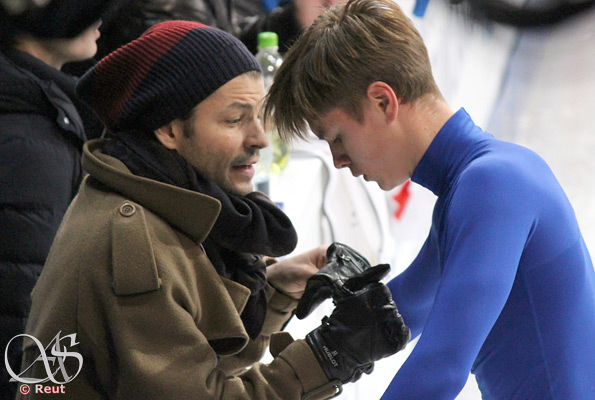About strong young hearts and (no) dangers of being Stéphane's student
June 11, 2017
By Reut Golinsky
Photo © Askar Ibragimov, Reut Golinsky
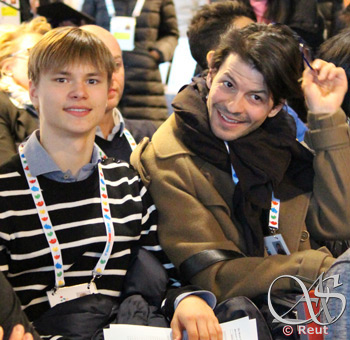 Guys, we need to continue, you can discuss it later...
Guys, we need to continue, you can discuss it later...
Deniss: We're too emotional sometimes, that's true.
You're very talkative, that's for sure.
Stéphane: And that's when I become very adult. When you become too emotional, I have to...
Deniss: No, when you're too emotional!
And if I thought we were done with the informal part and now we'd proceed to the "normal" conversation, I was too naive. With these "two monsters" - Stéphane's description - even formal Q&A turns into a very dynamic and lively discussion.
Different pretty much in everything - age, education, background, experience, temperament - they are so in tune with each other. They talk simultaneously, finish each other's sentences (and sometimes my questions too, without letting me explain myself!), and have similar reactions. Still they are very different, with their own opinions, beliefs, and voices. I hope both their personalities - very similar in certain ways, very different in others - will shine through this not very formal, but at times rather deep talk.
OK, so who was too emotional today? (We talk a few hours after Deniss finished his free skate)
Deniss: Today? Both!
Stéphane: He was.
Deniss: And he was also!
Stéphane: No, I was controlling my nerves!
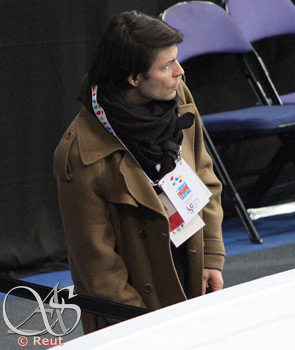
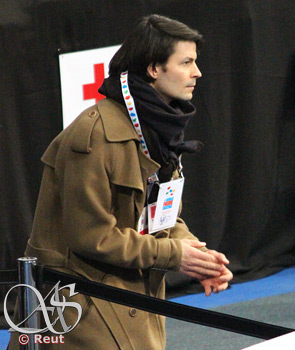 Stéphane, controlling his nerves during the short program
Stéphane, controlling his nerves during the short programAfter the short, in the mixed zone, you, Stéphane, said that you couldn't feel your body.
Stéphane: It was because I was very hungry. I didn't eat lunch, and it was four o'clock already. I felt so exhausted. I was shaking after the performance, and I couldn't even understand what was happening. But it was just because I was in a hypoglycemic state.
Deniss: Let's say I was super nervous about everything, both today and before today. Last year, [at Worlds] in Boston, when I got to the short program I was crying just before I went on the ice, because I was so afraid I would not qualify for the long, which was the main goal for me. After I qualified I was super happy because I did my job. And here, of course, the main goal was to qualify for the Games.
But why were you so nervous? You almost for sure would have qualified!
Deniss: No, not for sure! Noooo.
Well, some disaster could have happened, but I mean, really, after such a great season...
Deniss: Yes, it's a result of our hard work, but still, look at the short programs here, everyone did so well! And you go on to the free skate and you know that everyone is in good shape. And look at how the free skate went, yes, there were mistakes, but...
Stéphane: And the problem is that right now with the starting order being influenced by the ranking you really feel that judges are influenced by that. It's not because it's Deniss but I feel that his components deserve more points, that's what I feel from an "external" point of view. Because he is one of those skaters who really bring a very strong performance, he shares his personality so much. Maybe he doesn't execute such a hard technical content but he lives the program.
Deniss: But most importantly, today I enjoyed it so much. I really loved it!
Stéphane: You just need to work. For sure, we need to work...
Deniss: But that's the thing that I find not equal.
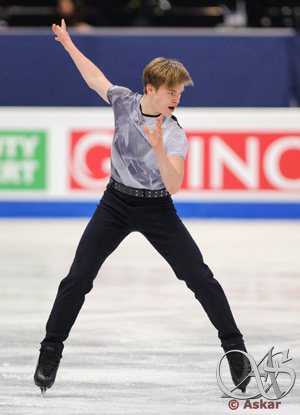 Life is not fair, I'm sorry to reveal that to you...
Life is not fair, I'm sorry to reveal that to you...
Deniss: No, by in sport - especially in sport - where you are supposed to always have the same possibilities, if someone comes from nothing with the same stuff as the other one who already has a name, they shouldn't be judged differently! When they did exactly the same stuff! Of course, I'm working, I understand that I have to work...
Stéphane: You just have to accept that skating has some rules and has a couple of things that we cannot change and, as figure skating is a sport where there is a little bit - or in your case a lot - of artistic side, you cannot measure that. And you just have to do it with your heart, with your passion...
Deniss: ... enjoy it...
Stéphane: And enjoy it.
Deniss: That's what I'm doing.
What's important is that the judges know your name now, they know you for who you are, and if you do more performances like you did here eventually it will influence and it will help.
Stéphane: In the long term.
Deniss: I'm working for it. I'm definitely not giving up. I'm only more motivated.
Stéphane: Hopefully! At seventeen! If you give up at seventeen what do we do? (smiles)
Deniss: You know, it's very easy to deeply hurt a young heart...
Stéphane: Oooh... But you have a strong young heart!
Deniss: I accept that I have to work more.
Having a coach who is very famous in the skating world brings certain "dangers" with it. For example, during the Rostelecom Cup, Stéphane got more attention that you, Deniss. During the competition the star, the center of attention should be a student, not a coach. So how did it feel for you?
(Stéphane at the background is making noises of disagreement)
Deniss: I can say one thing, when you have a very famous coach everyone expects you, his student, to be on the same level. But it's not exactly bothering me, because I know where I'm going, I know my objectives. So I just do my best and I work to become better than my coach. Because if the coach manages to make his athlete better than he was, it only proves the greatness of this coach.
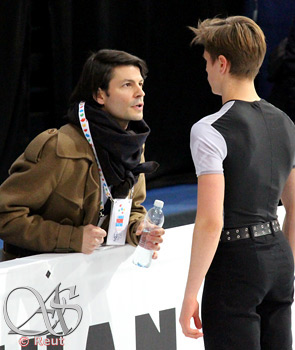
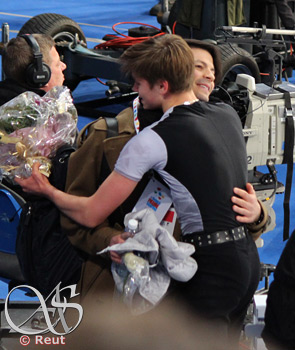
Stéphane, you don't agree that you get more attention?
Stéphane: It might happen... But I don't put myself to the front.
No, I don't blame you, I don't think you do. It just happens with you, inadvertently.
Stéphane: It happens probably because I'm still very active and I still skate.
Yeah, it's still fresh, fans still remember you competing at the very same arena...
Stéphane: Probably that's the case. Right now I'm responsible for his career, when I come to competitions I'm not the performer... When we go to do shows I say to Deniss: "Your coach is not here. I'm a performer of this show, and if you have a problem we have your manager, or we have Marla [Pichler, physiotherapist]". And I can always help if there is an emergency, but he knows that when we're in the show...
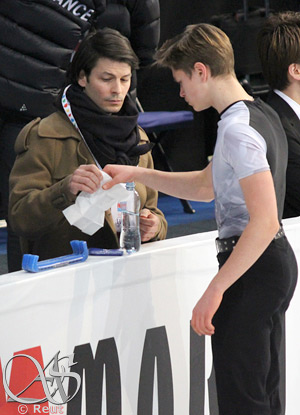 Deniss: Better not to touch him, he is always pissed.
Deniss: Better not to touch him, he is always pissed.
Stéphane: (laughs) That's not true! But when we're in shows, I'm the performer, when we're in competition the performer is him and I'm doing everything so that his environment becomes stable, healthy, that he can perform at his best.
Deniss: Supernanny.
Stéphane: I'm Supernanny.
A day before yesterday, in the mixed zone, he actually called you "policeman".
Stéphane: Policeman? I'm not a policeman!
Deniss: But you're taking care of how I eat, how I train, what I do. You take care of everything, so it's a kind of control, something that policemen normally do. Right?
Stéphane: Nnnno.
Deniss: But you're not so...
Stéphane: ...mean?
Deniss: Mean, exactly. So let's say you're a very nice controller.
Stéphane: Such a lovely description of my job! I'm a nice controller! Where is your ticket for the tram?
Deniss: Here, it's in my pocket! (showing as if he is taking a ticket from his pocket)
Stéphane: Come on, I'm a bit more than just a controller! Hopefully.
Deniss: Yeah, you are.
Stéphane, do you have a line, a limit for not over protecting him?
Stéphane: Over protecting?
Not being "over" present in his life. Just a few examples, you were the only coach sitting with him in the "green room" at Euros, coaches also usually don't come to gala practices, you did. Just examples of giving or not giving your student some space.
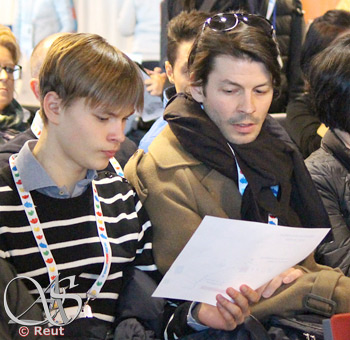 Stéphane: Well, the examples that you give were not relevant. At the gala practices I was not the only coach, there were other coaches who came.
Stéphane: Well, the examples that you give were not relevant. At the gala practices I was not the only coach, there were other coaches who came.
Deniss: Also, practice for gala is the same work, same practice towards the performance as any other.
Stéphane: And about the "green room"... Since I was a [competitive] skater not a long time ago, the ISU asked me to sit there. I happened to be nearby and it just happened like that.
Also, Deniss is seventeen. He is probably very mature for his age but I'm responsible for him. His parents are not living close to where he practices, so I have a big responsibility and I feel that it's my job to coach him, but it's also my job to educate him, to know that he is working for his school, that he is eating correctly, that he goes to sleep.
Deniss: All this is a part of education.
Stéphane: If he was with his parents, I would not have this task, but since he is not, I think it's very important that someone takes this responsibility, gives him a frame for his life.
Deniss: Because in that way at least someone controls the chocolate! (laughs)
Stéphane: But there are moments when I'm not there, when I'm gone and then he is able to do what he wants.
Like, from 20:00 till 20:30?
Stéphane: No! There are days when I'm leaving, when I'm gone for shows or for competitions with my other students. When I am gone, he is practicing with my colleagues at the rink. 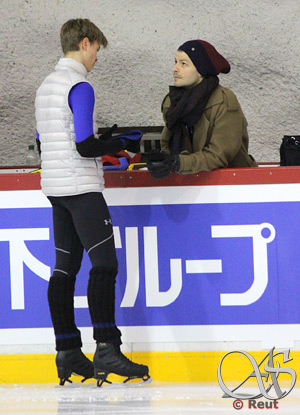 So I'm not with him 24/7. But I think I'm giving him the strong and stable frame, a good environment so that he can perform, he can work, and he can be mentally prepared for the hard work.
So I'm not with him 24/7. But I think I'm giving him the strong and stable frame, a good environment so that he can perform, he can work, and he can be mentally prepared for the hard work.
Deniss: And I can say that when he is not far away and I know where he is, it feels more safe, knowing that I always can reach him easily. Although I haven't learned yet how to use the phone (Stéphane laughs, apparently this is some inside joke of theirs), but we're working on that. In general I'm not a huge fan of phones.
I actually noticed that, and uncharacteristically for your age you're not a huge fan of social media either.
Stéphane: And that's a good thing! You have to congratulate him for that!
Yes, maybe, but I just wondered why.
Deniss: (trying to catch up on the conversation) What's wrong?
It's not exactly wrong, but...
Stéphane: (to Deniss) ...that you're not a big fan of being present in the social media. But it's a compliment! Because nowadays people completely disappear into their social media life...
Deniss: Like Facebook and stuff?
You do have those but you rarely use them. Why?
Stéphane: But why do you need it? Why would you need it?
His fans need it?
Deniss: I'm just happy to live a life where I see a person, I can touch him, or talk and see his emotions.
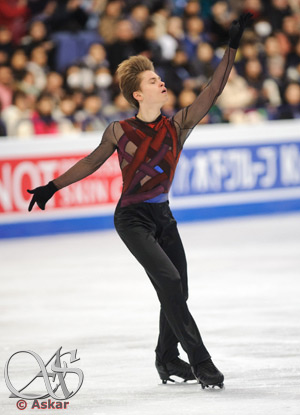 Oh, you're very similar in this, you definitely found each other...
Oh, you're very similar in this, you definitely found each other...
Stéphane: We are very similar, that's for sure. We have many similarities, we love chocolate (says Stéphane while finishing some).
Deniss: I love cheese, you don't!
Stéphane: That's a biiig mistake.
Deniss: That's a huge advantage.
If we're talking about you being similar, one of the additional "dangers" of being Stéphane's student...
Stéphane: There are no dangers!
...anything you, Deniss, do will be compared to how he does that...
Stéphane: Do you have another question? I don't like this question.
OK, another question... Wait, I didn't even ask the question yet!
Stéphane: No, but there are no dangers of being my student!
Deniss: I think she just wants to say that...
Stéphane: There are no dangers.
Deniss:... that people like to compare... but I don't see that!
Do you know that a Russian commentator, during the Europeans' gala, called you...
Deniss: ...the second Stéphane Lambiel?
Almost. He called you Deniss Lambiel.
Stéphane: But it's OK! He has a little bit of my genes.
Deniss: We do have a lot in common. For example, in spins, we take a lot of time working on them... but it's not in the way that they are the same...
You actually have quite different spins...
Stéphane: They are very different... But he too loves to create new positions.
Deniss: We like to create, we like to perform...
Stéphane: We like [to be] personal...
Deniss: We love to make everything perfect, we love to develop ourselves, we love to become better every day, each time we try something new. And that's what makes people notice that we have certain things in common.
Stéphane: And there are no dangers...
Deniss: But there are no dangers. We just have certain similar parts in our characters.
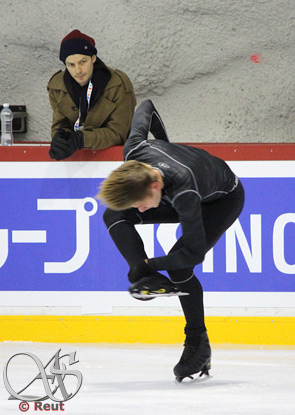
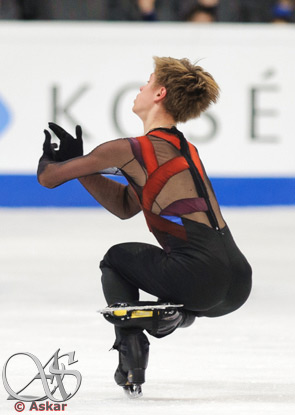
Stéphane: What I want to say is whoever the coach, in the end the student has to do his job. Your coach can be Queen Elizabeth or...
Deniss: ...Donald Trump...
Stéphane: ...or whoever you want, it doesn't matter as long as this person is capable of teaching you and putting you in the right place at the right moment. And if his name is Queen Elizabeth, then it's Queen Elizabeth.
Deniss: And it doesn't mean that the skater is supposed to be Queen Elizabeth II.
Stéphane: Or III, or IV.
Let's focus now on things where you're not similar. You will need to finish the sentence: "Deniss/Stéphane is better than me in..."
Stéphane: Deniss is better than me in... cheese eating! (both laugh)
Deniss: Stéphane is better than me in chocolate eating and knowing which chocolate is better.
Stéphane: Deniss is better than me... in drawing.
Deniss: Stéphane is better than me in taking care of laundry.
Stéphane: (laughs) That's true. Deniss is better than me in... beer making.
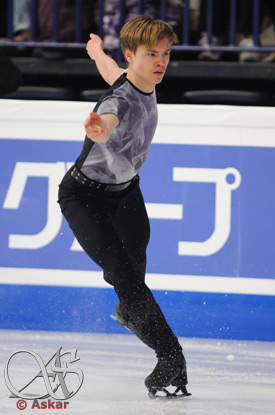 Beer making?
Beer making?
Deniss: I make honey beer. I'm not drinking it, but I'm making it. We're just discovering how to make it special. Even he enjoyed the last one!
Stéphane: OK, next.
Deniss: Stéphane is better than me in kitchen cleaning.
Stéphane: I'm better than you in laundry and in cleaning? OK, I got the message. (laughs)
Deniss: No, overall in the kitchen, much much better because my cooking is still not so great...
Stéphane: Only in the kitchen?
Deniss: No, in a lot of things you're much much better than me. In skating skills, in creativity I think, in being free...
Stéphane: (finally satisfied with the answer) OK.
Deniss, who is more picky, your mom or Stéphane? (during our last interview Deniss said that his mother is very demanding and "for her even a quintuple jump won't be enough, she will ask why he didn't try three quintuples")
Deniss: I'm not giving to my mom that many possibilities to be picky. Also I'm more focusing on what my coach tells me. And I think I myself try to be sometimes more picky than even my mom or Stéph, because things can always be better and we're perfectionists, so...
But Stéphane is very picky as far as I know.
Stéphane: I'm picky but Deniss is very picky too and that's what I like [in him].
Deniss: Of course I am. If you're not self-critical enough you won't always see clearly the road you should continue on...
Stéphane, during the fan meeting in Verona you mentioned that Deniss reminds you of yourself at that age. And that was not a compliment actually.
Stéphane: Whaaat? It is!
No, it was not, you said that sometimes you felt like: "Oh, my God, I was really like this?!" But it was in October when you only started...
Stéphane: I think actually he is much much much much more mature than I was when I was seventeen, he is much wiser. For sure.
And the last question is about "Yuri on Ice" anime series, I know you both are fans, me too. As someone who knows the figure skating world from the inside do you think that this world is described accurately in the series?
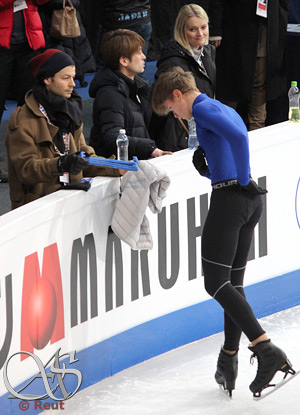 Stéphane: It's a fantasy world.
Stéphane: It's a fantasy world.
Deniss: Of course, you can always make parallels. And everyone can think whatever they want to think and find whoever they want in certain characters. Almost all the stories nowadays, they were told before but are just re-written in different ways. Of course, it's specifically created to be interesting and fascinating to watch, all this is a part of strategy of making people to enjoy, especially the audience they are initially produced for. And, of course, creators try to pick some situations to make you guess what is behind them. And based on your opinion about that person or situation you will understand that differently. Everything you see in this show is not a recreation, no. It's more like new characters based on certain perceptions.
Stéphane: I just think that it's a great TV show, because it brings skating to another level. And that is useful because people that love anime get to understand the skating world. But is this comparable to what we live in the skating world? No, that's a fantasy. I mean when you watch a movie you don't have to believe in and understand every single thing, every single scene, you just have to enjoy watching it and sometimes not to question too deeply what is happening.
Deniss: And it's also nicely done. It's an anime of a high level.
So you say: enjoy but don't...
Stéphane: ... don't judge and don't compare...
Deniss: ...you can think what you want, it's your choice what you believe in.
Stéphane: You have a chance to identify the characters the way you want and you don't need to be right or wrong, just enjoy.
Deniss: Exactly.
In the middle of our talk Stéphane suddenly interrupts himself, picks an eyelash from Deniss' cheek and says to him: "Blow it and make a wish!" Like with any other task from his coach Deniss completes this one thoroughly and thoughtfully. I doubt there is any scientific proof that eyelashes can make dreams true. But Stéphane certainly can. A year ago Deniss was struggling with the injury, not being able to skate without pain for months while still dreaming to qualify for the Olympic Games. Stéphane helped him to fulfill this dream by first finding the best possible treatment and then creating for him a stable and comfortable environment to work hard and improve in his skating. May this coming Olympic season be fruitful and enriching for both and many more of their wishes come true in the coming year.
